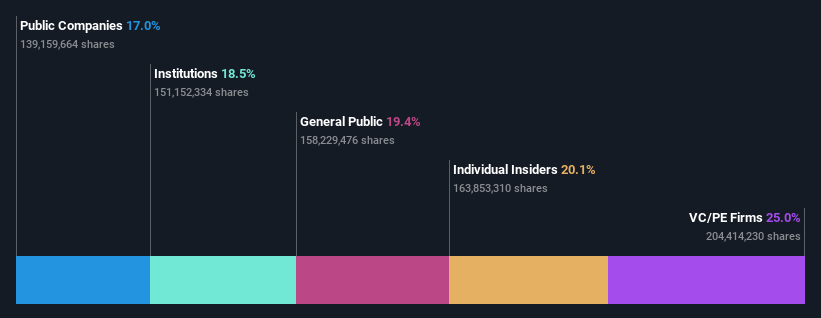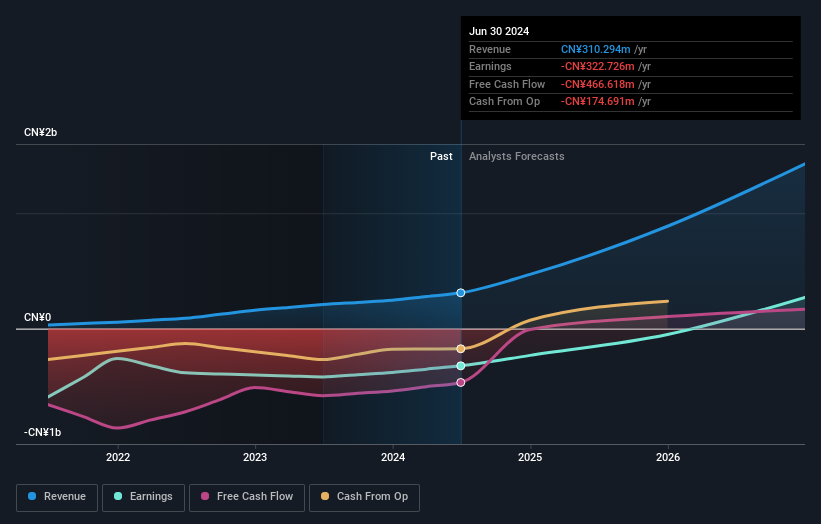Private equity firms are Ocumension Therapeutics' (HKG:1477) biggest owners and were hit after market cap dropped HK$392m

Key Insights
- Significant control over Ocumension Therapeutics by private equity firms implies that the general public has more power to influence management and governance-related decisions
- The top 4 shareholders own 58% of the company
- 20% of Ocumension Therapeutics is held by insiders
Every investor in Ocumension Therapeutics (HKG:1477) should be aware of the most powerful shareholder groups. With 25% stake, private equity firms possess the maximum shares in the company. In other words, the group stands to gain the most (or lose the most) from their investment into the company.
While insiders who own 20% came under pressure after market cap dropped to HK$3.8b last week,private equity firms took the most losses.
Let's delve deeper into each type of owner of Ocumension Therapeutics, beginning with the chart below.
Check out our latest analysis for Ocumension Therapeutics

What Does The Institutional Ownership Tell Us About Ocumension Therapeutics?
Many institutions measure their performance against an index that approximates the local market. So they usually pay more attention to companies that are included in major indices.
We can see that Ocumension Therapeutics does have institutional investors; and they hold a good portion of the company's stock. This can indicate that the company has a certain degree of credibility in the investment community. However, it is best to be wary of relying on the supposed validation that comes with institutional investors. They too, get it wrong sometimes. If multiple institutions change their view on a stock at the same time, you could see the share price drop fast. It's therefore worth looking at Ocumension Therapeutics' earnings history below. Of course, the future is what really matters.

Hedge funds don't have many shares in Ocumension Therapeutics. The company's largest shareholder is Alcon Inc., with ownership of 17%. The second and third largest shareholders are Lian Yong Chen and 6 Dimensions Capital Limited, with an equal amount of shares to their name at 15%. Furthermore, CEO Ye Liu is the owner of 4.2% of the company's shares.
On looking further, we found that 58% of the shares are owned by the top 4 shareholders. In other words, these shareholders have a meaningful say in the decisions of the company.
Researching institutional ownership is a good way to gauge and filter a stock's expected performance. The same can be achieved by studying analyst sentiments. There are plenty of analysts covering the stock, so it might be worth seeing what they are forecasting, too.
Insider Ownership Of Ocumension Therapeutics
The definition of an insider can differ slightly between different countries, but members of the board of directors always count. The company management answer to the board and the latter should represent the interests of shareholders. Notably, sometimes top-level managers are on the board themselves.
I generally consider insider ownership to be a good thing. However, on some occasions it makes it more difficult for other shareholders to hold the board accountable for decisions.
It seems insiders own a significant proportion of Ocumension Therapeutics. Insiders have a HK$772m stake in this HK$3.8b business. This may suggest that the founders still own a lot of shares. You can click here to see if they have been buying or selling.
General Public Ownership
The general public-- including retail investors -- own 19% stake in the company, and hence can't easily be ignored. This size of ownership, while considerable, may not be enough to change company policy if the decision is not in sync with other large shareholders.
Private Equity Ownership
With an ownership of 25%, private equity firms are in a position to play a role in shaping corporate strategy with a focus on value creation. Some might like this, because private equity are sometimes activists who hold management accountable. But other times, private equity is selling out, having taking the company public.
Public Company Ownership
We can see that public companies hold 17% of the Ocumension Therapeutics shares on issue. It's hard to say for sure but this suggests they have entwined business interests. This might be a strategic stake, so it's worth watching this space for changes in ownership.
Next Steps:
While it is well worth considering the different groups that own a company, there are other factors that are even more important. To that end, you should be aware of the 1 warning sign we've spotted with Ocumension Therapeutics .
If you are like me, you may want to think about whether this company will grow or shrink. Luckily, you can check this free report showing analyst forecasts for its future.
NB: Figures in this article are calculated using data from the last twelve months, which refer to the 12-month period ending on the last date of the month the financial statement is dated. This may not be consistent with full year annual report figures.
New: AI Stock Screener & Alerts
Our new AI Stock Screener scans the market every day to uncover opportunities.
• Dividend Powerhouses (3%+ Yield)
• Undervalued Small Caps with Insider Buying
• High growth Tech and AI Companies
Or build your own from over 50 metrics.
Have feedback on this article? Concerned about the content? Get in touch with us directly. Alternatively, email editorial-team (at) simplywallst.com.
This article by Simply Wall St is general in nature. We provide commentary based on historical data and analyst forecasts only using an unbiased methodology and our articles are not intended to be financial advice. It does not constitute a recommendation to buy or sell any stock, and does not take account of your objectives, or your financial situation. We aim to bring you long-term focused analysis driven by fundamental data. Note that our analysis may not factor in the latest price-sensitive company announcements or qualitative material. Simply Wall St has no position in any stocks mentioned.
About SEHK:1477
Ocumension Therapeutics
Operates as an ophthalmic pharmaceutical platform company in the People's Republic of China.
High growth potential with adequate balance sheet.
Market Insights
Community Narratives




